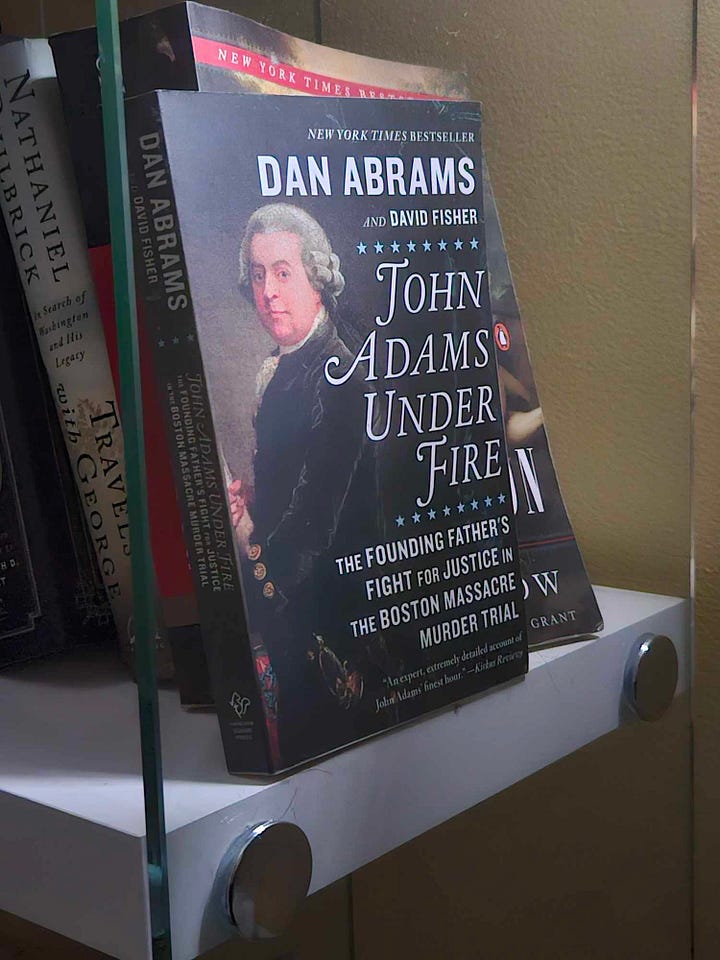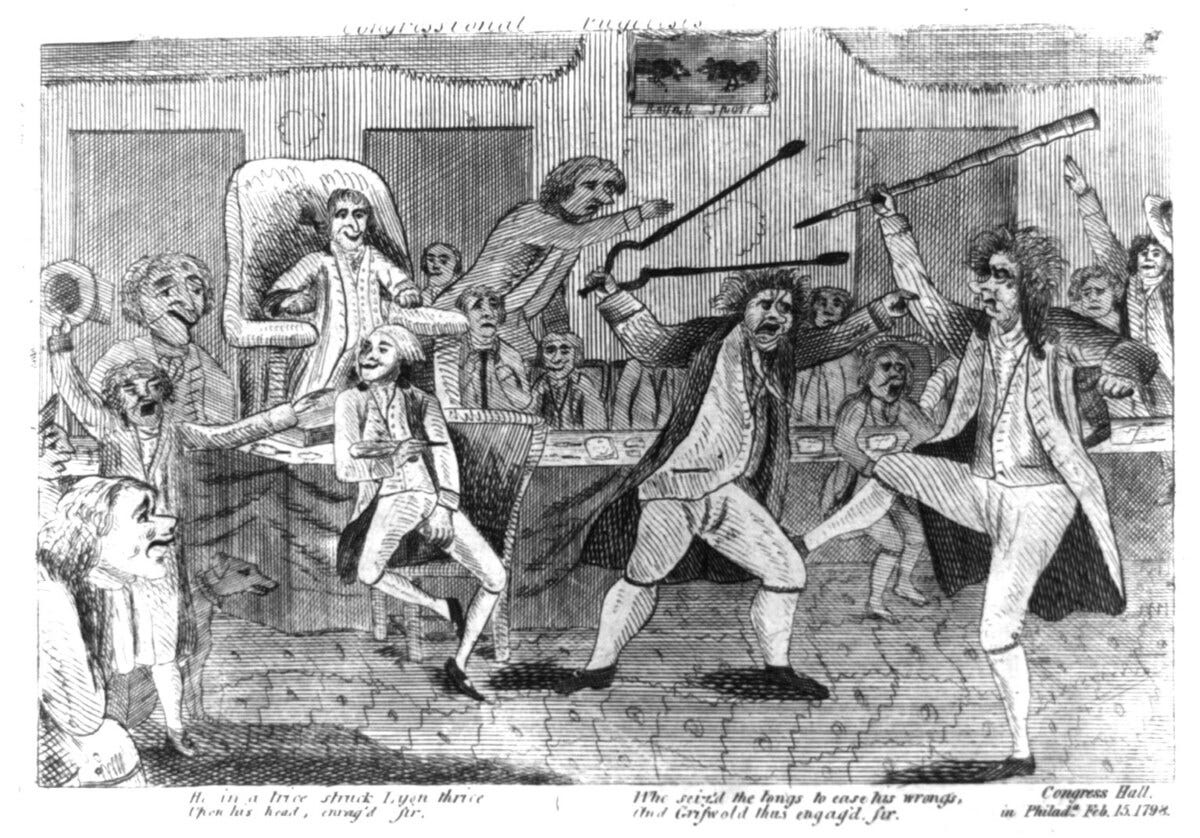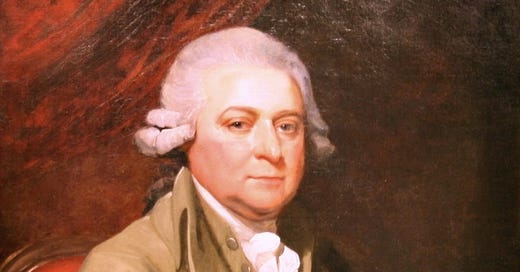Currently, I am challenging myself to read a book about every US president and share some of what I learn here on The Silent Sod. I started with George Washington, and now, I’m on to our nation’s second president, John Adams.
The two books I picked for John Adams were John Adams by David McCullough and John Adams Under Fire: The Founding Father's Fight for Justice in the Boston Massacre Murder Trial by Dan Abrams and David Fisher. In a prior Silent Sod post, I wrote about some of my takeaways regarding the personal life of John Adams. I will expand this to some of the takeaways from reading about his political life in this post.


The trial of the British soldiers involved in the Boston Massacre
I picked John Adams Under Fire: The Founding Father's Fight for Justice in the Boston Massacre Murder Trial by Dan Abrams and David Fisher primarily because I find books related to the legal system intriguing. Also, I thought it was interesting that before his presidency Adams had served as a lawyer for British soldiers on the opposite side of the Revolutionary cause. This book was extremely interesting and well written. My takeaway from it in regards to Adams is that he faced unpopularity and even danger during his political career due to taking action that was not popular at a time of intense excitement around the political scene. People wanted to take the most extreme and violent actions against the British soldiers involved in the Boston Massacre. Adams found the courage to say, let’s be rational. I believe that his decision was important in establishing the ideal in the legal system that a person is innocent until they are proven guilty, even at times when we would like to set aside the legal nuances and hasten the punishment. I look forward to reading additional books by these authors about legal stories involving other presidents.
John Adams and his presidency
John Adams by David McCullough was an in depth biography about John Adams involving both his personal and political life. I will share some of my takeaways in reading about his presidency.
Similar to our modern era, Adams served as president in a time when there were intense disagreements between the Federalists and the Democratic-Republicans.

Adams was considered a Federalist, but in my opinion, he did not always make his decisions based on partisan lines and often made those in his party furious in making independent decisions. Similar to his actions taken during the Boston Massacre trial, he often faced criticism and fury from others for doing what he knew to be the best for his country. Adams held strong to his belief in maintaining peace during the French Revolution. One part of his presidency when he did have some consensual popularity was his role in the founding of the Navy to ensure the security of the United States during the tense time in negotiations with France.
A Losing Precedent
One thing I found a bit surprising, given our expectations of presidents in modern times, is that John Adams did not attend the inauguration of his successor, Thomas Jefferson, after he lost to him in 1800. Adams left for his home in Massachusetts the morning of the inauguration at 4am. He never stated why he left, but there are different reasons this may have happened. Adams’ son had recently passed away after his struggle with alcoholism, and Adams had faced intense attacks by his political rivals and he may have just decided it was too much. There is also the possibility that due to the intense rivalry between the two parties of the time, he may have wanted to avoid inciting any violence by his presence.
I was interested after reading this: who was the first president to establish the precedent of attending the inauguration after losing the presidency? Before I answer that, here is the story of others who did not attend after Adams.
John Quincy Adams, 1829
Adams’ son John Quincy Adams did not attend the inauguration of Andrew Jackson. There had been a high level of tension between the two candidates. Adams decided not to attend and further had not been invited by Jackson.
Martin Van Buren, 1841
There was no noted animosity between Martin Van Buren and William Henry Harrison. There seemed to be two possibilities of why Van Buren did not attend. He, like Adams, had faced a great deal of animosity in the press and may have decided it just was not worth it to him to attend. Van Buren’s son was also dealing with an illness at the time of the inauguration, and he may have wanted to be with him.
The first losing president to attend the inauguration

So who was the first president to attend the inauguration of his successor? It turns out it was the same president who was the first one to hold two nonconsecutive terms, Grover Cleveland.
In 1889, he attended the inauguration of Benjamin Harrison and even held an umbrella for him as he made his acceptance speech. Apparently his act of unity was not lost on the crowd.
An article from the Harrisburg Telegraph dated March 5, 1889 titled “The Incoming Gracefully Acknowledges the Courtesy of the Outgoing” reads:
“The one dramatic incident of the delivery of the address occurred when President Harrison uttered the words of acknowledgement of the courtesy of the retiring President, which were not in the original copy. He spoke those words with evident earnestness and sincerity, and as he concluded the interjected sentences he lifted his hat and bowed to his predecessor. Mr. Cleveland arose and returned the bow profoundly.”
Conclusions
It is interesting that Adams seemed to set a precedent for a time in American history in regards to not attending the inauguration of his successor that like many other American precedents eventually was evolved upon. I believe he did the best he could during a time of great upheaval. In later years, Adams would eventually reach out to Jefferson and reestablish their friendship in letters. This literary relationship in itself has become an American treasure. Adams had tough shoes to fill in coming in after George Washington, the man whose popularity and image were so meaningful to the people. Adams was the first who had to prove to the country after that political giant that the position was strong enough to lead the new nation. I think he was the right person to fulfill that transition and he made some important steps for our emerging nation, though they might not have been popular at his time.
Sources:
https://www.whitehousehistory.org/press-room/press-backgrounders/white-house-transitions-fact-sheet
https://vanburenpapers.org/why-didnt-martin-van-buren-attend-william-henry-harrisons-inauguration






I found the part about presidents attending inaugurations especially interesting.
I have to say it, I like Adams and his spicy little self lol. He seemed like an interesting man who was able to take it on a lot around him in stride. I should have mentioned his wife was also an amazing and strong woman! Now onto Thomas Jefferson!